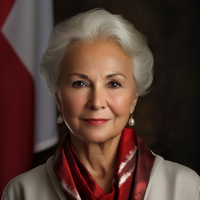Renáta Mišurová: Difference between revisions
No edit summary |
No edit summary |
||
| Line 2: | Line 2: | ||
| honorific_prefix = [[Her Excellency]] | | honorific_prefix = [[Her Excellency]] | ||
| name = Renáta Mišurová | | name = Renáta Mišurová | ||
| image = | | image = Renáta_Mišurová.png | ||
| image_size = 200px | | image_size = 200px | ||
| order = 8th | | order = 8th | ||
Revision as of 22:24, 3 October 2023
Renáta Mišurová | |
|---|---|
 | |
| 8th Prime Minister of Holynia | |
| Assumed office 11th March 2019 | |
| Monarch | Mikuláš I |
| Deputy | Alexej Kubík |
| Preceded by | Štefan Jahnátek |
| 16th Leader of the Opposition | |
| In office 2 April 2016 – 11th March 2019 | |
| Prime Minister | Štefan Jahnátek |
| Preceded by | Vít Ošetřil |
| Succeeded by | Erik Prokop |
| 22nd Minister of Labor | |
| In office 28 June 2013 – 19 May 2014 | |
| Prime Minister | Janos Ratkovek |
| Preceded by | Sebastian Kašpar |
| Succeeded by | Leoš Švarc |
| 14th Minister of Justice | |
| In office 3 September 2011 – 27 June 2013 | |
| Prime Minister | Janos Ratkovek |
| Preceded by | Radim Kozák |
| Succeeded by | Šimon Kraus |
| Personal details | |
| Born | Renáta Irma Kováčová July 12, 1951 Bystrica, Holynia |
| Political party | National Renewal Party |
| Spouse | Valentýn Mišurovec |
| Children | 2 |
| Education | State University of Bystrica |
Renáta Irma Mišurová (née Kováčová, born 12 July 1951) is a Holyn politician who has served as Prime Minister of Holynia since 2019. She has been a Member of the Narodna Rada (MNR) since 2002. She has served as Leader of National Renewal Party since 2016. She also served in Cabinet positions during the Ratkovek government as Minister of Justice and Minister of Labor. She also served as Leader of the Opposition from 2016 to 2019.
Mišurová was born and raised in Banská Bystrica. She attended the State University of Bystrica and worked for the Workers' Party newspaper branch in Bystrica. Mišurová moved to Cizekporok in 1972 and worked for the Pioneers Branch of the Workers' Party. She attended Volen Hajek State University in Cizekporok, earning a law degree in 1978. Mišurová worked as a judicial assistant for several courts in Cizekporok before becoming a lawyer for the Cizekporok Prosecutors Office. In 1991, Mišurová left the Prosecutors Office and became a defense advocate. In 1998, Mišurová was a founding member of the National Civic Party. In 2002, she became a Member of the Narodna Rada following the 2002 national election. She supported the 2004 motion of no confidence against the Široký government.
Mišurová's position within the National Civic Party began to rise after its merger with the right-wing Renewal party. This was even more evident in the parties opposition to Prime Minister Andrej Sedláček, leader of the Workers' Party. In 2007, Mišurová led a parliamentary inquiry into the Sedláček government, accusing it of corruption in refusing to privatise state industry. In 2010, she became leader of the Narodna Rada's Justice Committee following her party's victory in the 2010 parliamentary election. In 2011, she joined the Ratkovek cabinet as Minister of Justice. Mišurová pursued a crackdown on drug smuggling into Holyn prisons. She was a candidate to become Attorney General in 2012, however this post went to Jan Šmíd. She became Minister of Labor in 2013, however she resigned from the government in 2014.
Mišurová led internal party opposition against Prime Minister Janos Ratkovek between 2014 and 2015. Mišurová is largely to be credited with leaks that led to Ratkovek's downfall and his 2015 resignation. Mišurová won election as Leader of National Renewal Party with 57% of party members supporting her. She became Leader of the Opposition against Štefan Jahnátek's government. Renewal has moved away from liberal conservatism and towards national conservatism and right wing populism since Mišurová took over the party. Mišurová led Renewal to victory in the 2019 parliamentary election, with the party gaining an outright majority of seats in the Narodna Rada. Mišurová formed a government on 11 March 2019, becoming Prime Minister. Her premiership has seen changes to immigration policy and nationalist economic policies being undertaken.